Books
While I'm nowhere near the avid reader my family thinks I am, I'd still say books are my favourite form of media. Like many people, I enjoy collecting them. Fairly simple.
Until I manage to create spoiler tags that look good and cosistently work, expect spoilers in each entry!
My Storygraph (try this app out if you haven't already) is somewhat active, although I'm considering replacing it with this page. I use these apps and sites to search for and buy my books! Please read this, I hope it's helpful. :)
Dates are written as DD/MM/YY.
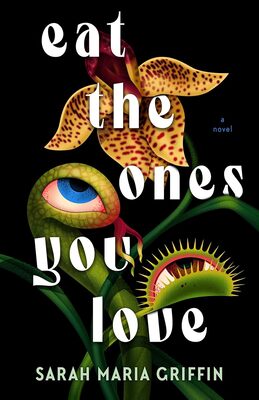
Eat The Ones You Love - Sarah Maria Griffin (2025)
3/5 - 20/1/26
After a rocky breakup with her now-ex-husband Gav, Shell is forced to move back in with her parents at their apartment. Alone, simultaneously alienated from her old friends and hounded by them to come back home, and unsure of her passions, a dilapidated mall on the verge of being torn down becomes her respite. The remaining shopkeepers welcome her with open arms in the middle of their battle to keep their livelihoods. Neve in particular takes an interest in Shell, offering her a job in the florists that she inherited from her aunt. Shell takes a keen interest in her back, one which will draw the interest of something right in the heart of the mall, waiting for the perfect moment to take what it wants from these women.
A little lower in this page I shared my many thoughts about A Botanical Daughter, and signed them off with the hope of finding a similar book with better plot. I was just about to leave my local library after a routine visit, empty-handed, and for no particular reason found myself drawn to the lowest shelf just next to the exit. I felt like I had struck gold.
I initially wasn't going to review this - it was one of the things I picked up from the library during my slump of easy reading - but each time I think about it, some of the things I hate the most in stories come up.
By far the greatest strength was the horror aspect. As cliche as it felt at times, it fit the mood for what was being confronted. Moving, twisting vines snaking up the wall of an abandoned mall storage facility, all somehow undiscovered by the public, concealing a man-eating orchid with one bright blue eye that can follow you by implanting spores into your skin is a wonderful blend of creepy and camp that reminded me not to take things too seriously here. Reaching out in the dark to grab a thorny vine is the kind of thing you only see in old cheesy B-films. I never watched Little Shop of Horrors, but I'll be trusting those who say it was an inspiration.
Going into this, I expected a little more focus on the relationship that formed between Shell and Neve over that of Shell and Kiero. The relationship between Shell and Neve wasn't lacking anything, necessarily, I just found myself crawling through chapters worth of Shell's personal adventures unable to see what it would amount to. I understand 'show don't tell,' but if you're going to tell us everything you can about the will-they-won't-they-oh-I-guess-they-won't between our protagonist and some guy, I'd like to be told a little more about either of the two relationships that I picked up the book for. Am I unlucky with F/F relationships, or ungrateful? Did Kiero really take the spotlight in Shell's love life over Neve as much as I remember? I can forgive the narrator not wanting to overshare about his relationship with his victim, but... it's a story at the end of the day. If I get sold a story about abuse and a woman's affair, I want to read about those things a little more than I do about someone's fling. Admittedly, it got to a point where I stopped caring about the direction of Shell and Neve - not only was Neve intertwined with Jen (a crucial plot point, no fault here) but Shell was preoccupied with too many other people.
There were lots of excerpts from Shell's group chat with her old friends, which... should've been anticipated given that I'm reading a contemporary novel. Still, do you really need to know which emojis are attached to each message? The sentence 'Talking through increasingly deranged memes was easier than saying anything at all,' was published in a physical book, which I presume went through an editor. 'Bouquet emoji, fire emoji, bicep flex emoji'... The single worst offender, which I have never seen anything alike in any other book, was the phrase 'Having an Extremely Normal One,' with that exact capitalisation, in a book that I was holding in my two hands. Couldn't believe it.
I was aware that the main theme was abuse and coercion, and I was looking for it in every line, yet I never came up with any profound thoughts on it. Baby was manipulative, in a very literal sense - he was able to physically force himself into people’s bodies and direct them according to his will. He made Neve feel indebted to him for disposing of her neglectful aunt, while giving her mess after mess to diligently clean up for him. He was toxic for her, and yet she kept choosing him over everyone else in her life. When he found her heart was with somebody else, he sought to take it from her by force. No matter how hard I mulled over what I had read, I could never find anything deeper than this. Whether it was because it was a bad book, or because I’m a bad reader, is still unclear, but I have no desire to reread this to find out.
I wouldn’t give this book to anyone, nor would I stop them from reading it.
Read from 29/7/25 - 16/8/25

1984 - George Orwell (1949)
3.5/5 - 9/11/25
I think a lot of people who haven’t read 1984 before are picking it up now, given how the world has, y’know, gone to shit. Is it relevant now more than ever or has this message always been relevant? I’m too young to know.
Huge chunks of the story are given in exposition, like Goldstein’s book (speaking of Goldstein, him not existing was slightly predictable) which can be a drag, especially given the complexity of some of the texts. Of course, this can sort of be overcome by rereading parts if you have the time, but you shouldn’t have to do that. Other than that, the writing style is fine.
The misogyny is simply too overbearing to ignore. Every aspect of Julia’s character is all for… She’s just intelligent enough to agree with Watson and his whims, but never takes it upon herself to think for herself. She never bothers, doesn't see the point in it. She falls in love with him almost instantly, after having had sex with so many men - to Watson’s delight, of course. She exists to either affirm his beliefs, or give him something to direct his exposition to.
Maybe I wasn’t in the right headspace to understand Room 101…? I’ll certainly read this book again at some point, but as a first impression, I don’t see how it was as horrific as it was made out to be. I missed out on that part. Unless the betrayal of Julia was supposed to be the horror, but in that case I never felt as though they had a genuine relationship. Probably because of how she was written.
As much as the pages upon pages of exposition ought to be criticised, though, I enjoyed reading them! ‘Goldstein’s’ book, the whole concept of newspeak, maybe I’m a little odd for liking these things.
The mundanity of the ending was nicely fitting. No conspiracy, everything down to power just for the sake of it, Watson’s reasimulation into society, all of it felt like it amounted to nothing, and it was… perfect. With a lot of what’s happening in the world right now, it does feel pointless to think about at times. Everything is about power, nothing more.
As for anything else… a bit too much time has passed since my first reading to say much else.
By this point, it has been ages since I read this. I was in a slump for a while and never wrote everything I’d planned to, but I don’t want this all to go to waste. Editing is minimal since there’s hardly anything that I want to work with here. I had something about doublethink but I’m beyond trying to articulate it better so I just… got rid of it.
Read from 16/7/25 - 29/7/25
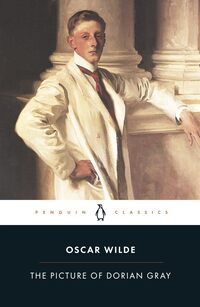
The Picture of Dorian Gray - Oscar Wilde (1891)
3.5/5 - 17/9/25
During a visit to his friend and artist, Basil Halward, aristocrat Dorian Grey comes to meet the highly philosophical Lord Henry, who grants him a new perspective on his life. Basil’s newest and greatest work, a painting of Dorian in all his beauty, and Lord Henry’s commentary on said painting, send Dorian into despair at the thought of losing his youth, and swears to give his soul away were it to force the painting to age while he remains young. As Lord Henry becomes his mentor, and as Basil becomes estranged from him, only the painting shows the depravity of Dorian’s life.
…eh? Horribly overhyped. Although it’s not exactly fair to call an influential classic ‘overhyped.’
I don’t know what exactly I was expecting, but it was more than what I got. Perhaps it’s just my specific corner of the internet painting this book as the masterpiece of all masterpieces. For some reason I spent a lot of energy combing through the appendix here more than for any other classic I’ve read, so maybe that contributes to my being underwhelmed…? As interesting as that information was, it might’ve taken me out of the story too much, made immersion difficult.
In the appendix I read that the chapters between Basil’s body being removed by Alan Campbell and Dorian’s final conversation with Lord Henry weren't in the original publication, and it does show in the pacing. Although without said scenes, we wouldn’t have gotten a resolution to James Vane’s threats to murder Dorian, which I admittedly would be more upset about. The revised pacing was objectively much better, I just found it a little difficult to get immersed in what was happening.
By far the most thrilling segment was Basil’s murder. From meeting him on the street to Dorian leaving his body, the tension only rose and rose, leaving us to dread what was to come. The ending was comparable, but a little too predictable to reach the tension of this scene.
Other than this… I never feel like I have enough to say about classics. Did I understand this? Do I not know enough about literature to really grasp what this book was trying to tell me? As far as I understand, the novel’s infamy was largely a product of its time, back when the contents would be more scandalous. As a 21st century reader, it came across as a sketchy philosophy book advising you on how not to live your life. At least, I don’t think Lord Henry was a good role model. I’m fairly certain he was trouble. That was indeed the point. Or one of the points being made.
I don’t think I’ve actually said anything much the book itself… sorry. It didn't click for me, for whatever reason.
Read from ? - 16/7/25
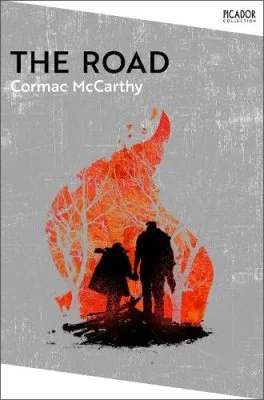
The Road - Cormac McCarthy (2006)
5/5 - 21/7/25
In a desolate post-apocalyptic America, burnt and ashen, a new Hell, a man and a boy have nothing but one another. Every person is a threat - that'll steal, attack, abduct, and cannibalise to survive, without care for anyone else left. The man carries a gun with only two bullets, one for himself and one for the boy, should things go awry. Their goal, aside from surviving, is to travel south down the road to avoid the brunt of the approaching winter. There's no way of knowing what waits for them, if anything at all.
I typically don’t feel much attachment to stories, simply enjoying them as cheap entertainment to pass a couple hours. However, I had to put this down multiple times because I thought I was going to cry. At one point I did cry. Who said that.
Going into this, I was expecting a lot more morbidity and, frankly, gore for the sake of gore. The worst of it was implied rather than shown, which for me conjured up more gruesome pictures of the land that any descriptors could’ve given. The few moments where their world was at its bleakest were used to let the tenderness of what they have left shine through.
Most of the story is spent on basic survival, gathering food and seeking shelter. There was always time for reflection and glimpses into how the man raised the boy, with the man’s attitude slowly overriding the boy’s natural optimism as people are abandoned and killed. Each conversation is gut wrenchingly emotional despite so little often being said. Not many words need to be shared between the two in order to say a lot - the setting, thet atmosphere, and their relationship already say enough.
When the grotesque comes in, though, it comes in hard. Trailers carried by slaves and stocked with women for pleasure, human herds locked away and hacked up piece by piece, roasted infants abandoned over spits to rot.
The man's faith, or now lack thereof, is a constant theme throughout. Grappling with the idea of whether God exists, and why He would let this happen, it ought to send him spiralling. He puts his new purpose in life completely in his boy. I imagine that someone with a religious upbringing, like McCarthy himself if I’m not mistaken, would have much more to say here, although even I found myself moved.
Most of this review could just be me sobbing. I have no idea why this impacted me in the way it did. On the same day I started reading, I bought another McCarthy book, something that I tend not to do until I'm certain I'll enjoy an author. One day I will certainly read it again, and hopefully produce more coherent thoughts, and most likely wonder why I shed so many tears. They loved each other goddammit.
Read from 20/5/25-26/5/25
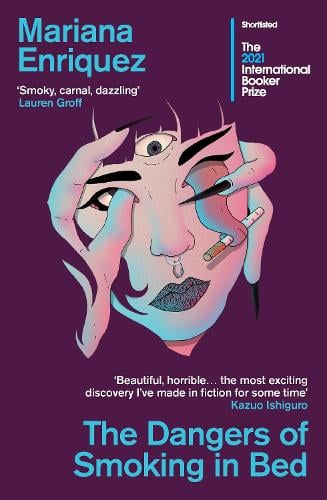
The Dangers of Smoking in Bed - Mariana Enriquez (2009)
4.25/5 - 23/5/25
A collection of short horror stories set in Buenos Aires, which were translated to English in 2021. They tell of murders, suicides, fetishists, ghosts, and witchcraft, peppered around through Buenos Aires and following its residents to their grim fates. Friends, bodies, and minds alike will be lost.
I tend not to be too keen on ghost stories, but I still enjoyed each one here. Towards the middle, there’s a slight shift away from supernatural horror, which I personally preferred.
I think my favourite was Where Are You, Dear Heart? - I strongly believe the best stories are about a fucked up weirdo going about their life. This 12-page tale follows a cardiophiliac through her lifelong obsession with the sick and dying, right up to finding what could be called her true love. Strongly recommend if you want to read about some fucked up weirdo. I fell in love as soon as she fell in love with Helen Burns from Jane Eyre.
The Well might have been the most chilling to me, for reasons that unfortunately would spoil the ending. I was at the edge of my seat waiting for the inevitable reveal of Josefina’s family pushing their fears onto her, at such a young age, no less, where she had no capacity to protect herself from people she was supposed to trust. Sometimes I like to lightly torment myself thinking about the idea of having to endure constant pain with no way of alleviating it, and this short really brought that fear to life.
As someone who is trying to learn Spanish, I appreciated the nods to the cultural differences between Spain and South America, particularly Argentina. Lifestyles and speech mannerisms were compared during Rambla Triste, and I ate it all up. Or I tried to. I wish I could recall those words that were unfamiliar to me.
There’s snippets of each story that I appreciated - the meat at the end of The Cart, The Lady Upstairs’ whole character in The Lookout, the morals of Nico in No Birthdays or Baptisms - and goaded me into reading the next, and the next after that. Even the ones that didn’t quite click for me gave me something to think about afterwards. Anyone who likes horror in any capacity will have something to latch onto in this collection, I reckon.
Read from 22/4/25-6/5/25
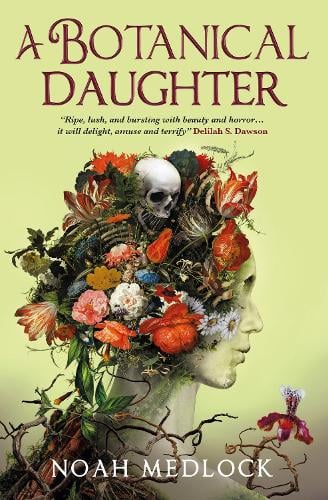
A Botanical Daughter - Noah Medlock (2024)
2.75/5 - 6/5/25
In 1889, up in the isolated ruins of the Sandys’ estate, sits Grimfern, a greenhouse which houses botanist Gregor Sandys and taxidermist Simon Rieveaux, their partnership hidden from the world. While Simon keeps to his own projects in the greenhouse’s basement, crafting scenes of weddings for kittens and suspending brains and spleens in embalming fluid, Gregor discovers a new fungus in his newest tropical delivery. It appears to be conscious, actively caring for the orchid which it feeds on. Enlisting his lover’s expertise, Gregor embarks on his most ambitious experiment yet - blurring the lines between plant and animal - with hopes to regain any shred of respect from the Royal Horticultural Society.
Jenny Finch, down in the village, has lost her best and only friend to suicide. Poor Constance had stabbed and then hung herself, supposedly. The church refused to bury a suicide victim, and so she and Constance’s father moved the body to a shallow grave under a hazel tree, which Jenny visits whenever possible to mourn her.
What a beautiful concept, and what a questionable execution.
Given the comparisons drawn between this book and Mary Shelley’s Frankenstein, I was expecting much more focus to be put on the morals of reanimating a corpse, especially one which had died so tragically. This… doesn’t happen, quite simply. There is discussion of morality, but only in the sense that Gregor believes his creation, Chloe, to be violent and dangerous. This is made that much more pitiful by the fact that it’s Gregor himself that inspires most of Chloe’s violent acts.
The majority of the characterisation was off. At first, Gregor is delighted, and unsuccessfully tries to convince Simon that this is a blessing for them both. Just as Simon all too abruptly accepts Chloe as his new daughter after lamenting that she is a mockery of God, Gregor then decides she needs to be hidden. His reasoning as to why she needs to be hidden shifts from time to time; it’s for her own safety, then it’s to prepare her for the RHS, then because she’s dangerous, and it’s never fully consistent. As much as we are told that Gregor is a rational man, we never get to see that side of him.
Jenny was too quick to notice everything that happened, except for the fact that Chloe is Constance. Her intuition for her masters’ feelings, her later distaste towards Gregor, stealing away Chloe - it felt like her ideas and whims only came to her as was necessary for the plot to advance, rather than them being organic.
Other small snippets of the characters essentially swapping personalities include Simon visiting the Finches’ house after telling them that he was off to London, without thinking of an excuse as to why he’s still in Buckinghamshire. Gregor’s sudden switching between his feelings toward Chloe felt nonsensical towards the end. It’s the little things that took me out of the story.
The main couple were amusingly snippy towards each other throughout, which I found delightful for the first half of the story. The way they know exactly how to rile each other up with the slightest of words, and how they would always try to make amends afterwards, made them oddly loveable. As Gregor descended into turmoil at his own creation, however, and as Simon grew affection for Chloe, the tension rose to a point where I couldn’t appreciate them together anymore. When Simon helped Jenny to take Chloe out of Grimfern, and he destroys his taxidermy, seeing them as vessels of his repression, I truly believed that Simon’s happy ending would be to leave Gregor for someone, or something, that would bring him greater satisfaction; where he could care for and love his two daughters away from Gregor’s control.
The scene where Chloe murders Constance’s father should’ve been part of the climax, I feel, while another erotic scene between Chloe and Jenny would’ve done well to show up a little earlier. Compared to the former - which I believe was less than half way through, if my memory serves me well - the ending was slightly anticlimactic.
Aesthetically, the ending was stunning, romantic, and hauntingly hopeful. In the context of the 300-and-something pages that proceed it… was that it? I can’t believe I’m saying this, but this story didn’t deserve the happy ending it got. If it wants to be gothic, it should commit to that.
And what was the point of the Julian Mallory subplot, anyway?
Some things that the book did right, though - the images conjured of Chloe, her nervous system, her core, her artificial voice, all of it was mesmerising. The writing style wasn’t half as bad as some have made it out to be (although I still highly doubt this story actually had an editor), despite having some weak points and irks. The concept itself is one that I’ll be scrounging for on the shelves until I find something that scratches the itch this book has given me.
If anyone sees something that takes this story and makes it into something more solid, please tell me.
Read from 8/4/25-21/4/25
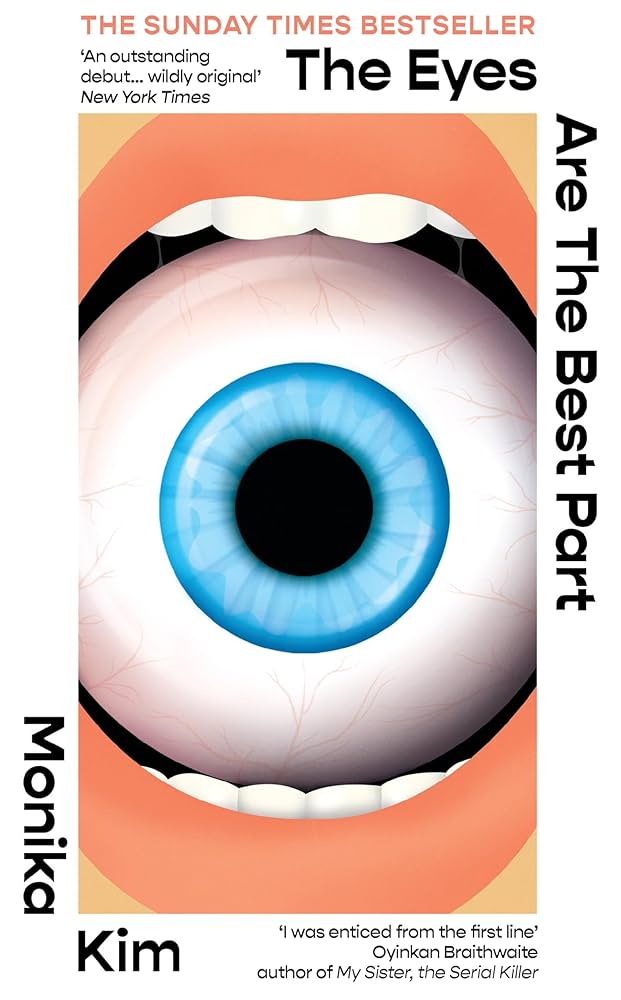
The Eyes Are the Best Part - Monika Kim (2024)
3.25/5 - 24/4/25
18 year old Ji-won is starting her first year in college. Her Appa has just left his family suddenly. Her Umma is struggling to cope with the loss. Eating fish eyes is supposed to bring you good luck, and so it becomes one of the many questionable things that Umma uses to cope with her loss. Another thing she uses to cope is getting a new boyfriend, George, a 50-something bright-blue eyed man with a fascination with east Asian culture, and its women.
Ji-won’s new personal life includes making new friends, reminiscing on old ones, escaping a stalker, enduring her own fetishisation, and protecting her family from George, whose eyes are truly the most beautifully radiant blue. Distractingly blue. Enticingly blue.
Throughout the story, Ji-won reflects on her life as an eldest sister, her appa and umma’s upbringing and how they shape the people they became, and her position in society as a Korean-American woman.
I… don’t have much to say for this one?
The writing style felt largely YA-ish, which is not inherently a problem, but it was unexpected for me. The majority of the writing felt flat, although quite easy to follow. For this reason, the dream sequences and Ji-won’s bouts of paranoia never took me out of the story or confound the plot in any way.
Some modern books fall into the trap of being overly PC, presumably in an attempt to not get the author in trouble on social media. I was scared that Geoffrey would be the vessel of this for The Eyes Are the Best Part, but thankfully this was addressed. He instead became a commentary on performative activism and one of its many purposes with the reveal of his intentions towards Ji-won.
And the character that calls this out… I couldn’t help but feel that some stronger character development was being teased for Alexis? This didn’t subtract from the story overall, but I was disappointed when I realised we wouldn’t get to see more of her, even though this isn’t her story.
The title does spoil everything, as you probably would’ve guessed. George’s death was in one way underwhelming - I wanted him to suffer much more. It worked well to wrap up each storyline, however, soI have no room to complain there.
Ji-won’s perception of her parents shifted as time went by; while her Umma changed from a sympathetic character, to the person who inflicted George onto her children, and back to being sympathetic, her Appa went through the opposite development. It almost sounds like Ji-won devolved back to her original self, nulling her development, but I can assure that this is not the case. The character development being a huge strength amongst other elements also gives this book its YA feel, in a sense.
Not the most in depth review, sure, but I truly can't think of much else to put here. I did enjoy reading this overall, though.
Read from 2/4/25-8/4/25
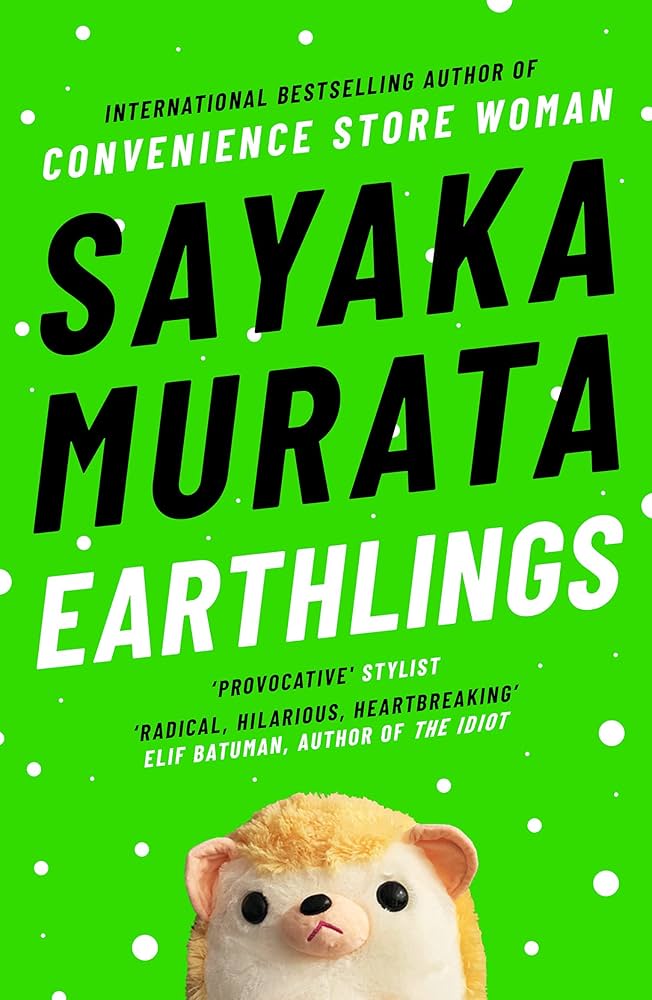
Earthlings - Sayaka Murata (2018)
very confused 4.75/5 - 15/4/25
Young Natsuki Sasamoto is leading a difficult life - abuse from her parents who strongly favour her older sister, predation from her young and popular X teacher, and a crippling inability to connect with her peers no matter how hard she tries. She is also an alien from the planet Popinpobopia, which she learned from Piyyut, an agent sent from her own planet that has taken the form of a stuffed hedgehog. Her only salvation is her cousin, and boyfriend, and fellow alien, Yuu, who she gets to see once a year for Obon. They promise each other in their improvised wedding to survive long enough to find the spaceship that will surely take them back home.
At 34, Natsuki has now perfected the illusion of a normal life. She’s taken up the work expected of her, married a likewise man who does not care for sex or affection, and successfully blended in with the other earthlings. She often wonders if there’s any hope of escaping the Factory - dozens of rows of nests in each city, each with a woman and a man whose sole purpose is to breed and work, an obligation which has been drilled into the earthlings’ brains.
Earthlings takes a unique approach to the common story of someone dissatisfied with their life and the expectations forced onto them from birth. This just might be the single weirdest book I’ve read in a long time. I could not have guessed the ending with a £50,000 prize and a week to do it.
Soon my entire body, not just my mouth, would be killed, and I would become a tool for grown-ups. I had decided some time ago that I would die before I let that happen.
Like most people, I burned through this in only 3 days. Unlike most people, I have not yet read Convenience Store Woman, so I can’t draw any comparisons, although the fact that both seem to tackle almost the exact same subjects is making me consider reading the latter.
Earthlings was easier to digest than what would be thought, both for its overall writing style and because a lot of the traumatic events are glossed over. This can be seen as both part of Natsuki’s perspective and her repression of these events, or as a flaw in the writing. I took it as the former, and found her dissociative way of describing her traumas as part of her characterisation.
The suspension of disbelief is vital to get through Earthlings, with events like young Natsuki getting away with murdering Mr Igasaki in such a dissociative state, or Yuu agreeing to her and her husband’s whole alien-rationality thing. While I suppose it would be in character of Yuu to agree to anything… this still felt far fetched.
I admit that the final chapters were perhaps a little too disconnected from reality, even for my tastes, but this wouldn’t be the same story if they were more down to earth. Natsuki’s bizarre breakdown from her emotional abuse and isolation catching up to her right when she reunites with the one person she can trust is the point. If you want a story that deals with its characters’ trauma in a healthy productive way, just skip this. Maybe read Convenience Store Woman instead. Apparently they’re similar.
The ending… that ending. It’s been over two weeks and I still don’t know what to make of it. It’s both crushing and heartwarming that our Natsuki managed to find comfort in such a situation. This is the most perplexing ‘good for her’ I’ve ever felt. The last few pages are even more perplexing, and as much as I’ve defended all the weirdness packed into so few pages, I can’t make out those final pages. Pregnant? All three of them? Is it something about conformity? Hypocritically conforming to a set standard once you feel more comfortable in a society? How you can’t truly escape what the Factory has planned for you no matter how far you remove yourself from it? Whatever it is, I’ll still be thinking about it two weeks from now.
This is both the tragic recount of an alienated young woman whose dissatisfaction with her own life and pressure from the world around her pushed her down a spiral of psychosis, and a mad journey into her delirium which can only be experienced, not described. I need to reread this at some point.
It was weird.
Read from 29/3/25-31/3/25

Dracula - Bram Stoker (1897)
...5? - 7/4/25
Solicitor Johnathan Harker sets off on a trip to Transylvania to meet up with his newest client, the mysterious and often eccentric Count Dracula, a man of grand wealth and corpse-like appearance who wishes to purchase property in England. Failing to heed the warnings of superstitious townsfolk, he finds himself a prisoner of the Count, and determines himself to look for escape by any means. His attempts reveal dark secrets that lie in Castle Dracula, alluding to the truth of the Count himself.
Back in England, Lucy Westenra chooses her lover-to-be out of three men who delivered their confessions to her all on the same day, unbeknownst of what will become of her and lengths these men will got to protect her soul; Dr Seward keeps a close log of his most fascinating asylum patient to date, who has a keen interest in consuming the lives of beings smaller than him; and the soon-to-be wife of Mr Harker, Miss Mina Murray, frets on his sudden silence and longs for his safe return.
I can’t remember the last time I was so elated to pick up a book. Despite having been rewritten, parodied, and turned into a whole new legend dozens of times, this still felt timelessly original. Each subplot added to the story rather than draw the spotlight away from what truly mattered. Each character had their own voice, their perspective, their sense of humour (particularly Johnathan), and it shone through every one of their journals - even down to the medium in which they were kept.
Well, the men at least had their own voices. The two women who we got to know, Lucy and Mina, didn’t feel distinct from one another. I wonder if this is what made me notice the mens’ strong characterisation, by comparing it to that of the women; or if I’d simply found a selection of engaging (male) characters after not having done so for a while.
Even Dracula himself was a rather enjoyable character, surprisingly, and I found myself drawn to him almost instantly.
By far, the best scene is the confrontation with Lucy, now turned and luring in children to drink their blood. There’s nothing I can write here that does its atmosphere justice.
Van Helsing’s knowledge on vampires wasn’t explained much beyond having studied the works of other, much older researchers. At times his knowledge felt too convenient, which broke the immersion slightly for me. How he knew that garlic flowers can deter vampires - or even why they do - is never elaborated on. I can only imagine there’s more cultural context (that certainly wasn’t in the appendix of my copy) that would make things like this obvious to readers of its time, but alas. Perhaps I’ll go search for it myself.
While I am aware of the themes of Victorian repression and sexuality… I don’t think I picked up on any while reading. I was looking, promise. What did occur me was the idea of an allegory for rape. Dracula’s main targets throughout the book were young women, and Mina’s turning was particularly grim, having her penetrated and bent down to drink the Count’s bodily fluids. Her cries of being ‘unclean,’ while certainly pertaining to religion, could be interpreted as sexual trauma. I thankfully have no experience with sexual assault of any kind, so I’m not exactly the best person to give an opinion on this. It’s just an idea.
…or I could be taking the meaning of sexuality too literally, and this is in fact the commonly agreed interpretation. I’m choosing not to read any analysis before writing all this.
I’d say that this is one of my new favourite books of all time, and definitely my favourite classic (although I have no idea what worth this would have to anyone else reading). Each chapter was thrilling and left me aching to know what happens next. This helped to rekindle my love for reading more than anything else I’ve picked up lately.
Read from 22/2/25-29/3/25
Our Wives Under the Sea/Nuestras Esposas Bajo del Mar - Julia Armfield (2022)
3/5 - 10/3/25
Atención - Este libro lo leí en inglés y no tengo ni idea si hay diferencias entre las versiones de inglés y español. Esta reseña se publicó originalmente aquí en el Pillowfort, hace 2 meses hasta ahora. Disfrútanlo! Mi español no es tan bueno ahora.
Yo leí este libro en 5 días más o menos, no cuento el tiempo que me toma terminar los libros. Solo tiene 229 páginas, lo debería haber completado en menos tiempo si no estuviera un poco cansada esos días.
Pues, la historia trata de una pareja casada de lo que una, Leah, recién salida de una excursión en el mar de 6 meses y la otra, Miri, ve cómo su esposa cambia poco a poco en una manera muy rara. Miri describe los cambios físicos de Leah, y los efectos que tienen en su estado mental y las memorias siguientes que irrumpen, en una prosa llena de metáforas. Mientras eso, Leah reflexiona en su viaje debajo del mar, cuando ella y su equipo estaban atrapados en un submarino rota y sin comunicación con el mundo atrás. El libro se escribe en primera persona, y salta entre Leah y Miri y sus historias.
Se describe como un libro de horror, y mientras veo el porqué, no se convirtió en todo lo que yo pensaba. El horror era mínimo en comparación con todo lo que pasa; de verdad, esta es una historia de la pena de una pareja perdida más que un horror. Desafortunadamente me decepcionó un poco, debería haber tomado las revistas en serio. Sin embargo, me gustó los escenarios que tuvieron esos pedazos de body horror, incluso si eran pocos.
Lo que me sorprendió más que hubiera es que Leah y Miri me parezcan una pareja muy realista y emocionada, cuando normalmente no me gustan las parejas ficcionales. Nada grandioso, solamente que son dulces.
En mi opinión, se trata de la muerte, no exactamente del matrimonio fracasado como piensan los demás que había visto revisar. A veces la trama de Leah era difícil de entender, especialmente el capítulo final. No quiero echar a perder nunca más, ni sé cómo describir todos mis pensamientos, así que no voy a escribir más de lo que pasa a Leah, pero saben que se convierte más confundible hacia el fin.
Por resumen, disfruté leer este libro de Julia Armfield, pero… no sea lo que busque. No voy a leer otros libros de ella, aunque estoy gracioso de leer y experimentar con este. Ojalá que tuviera más que quería decir de eso, pero esta tipa de historia simplemente no es algo que me afecte mucho.
Leído desde 6/12/24-9/12/24
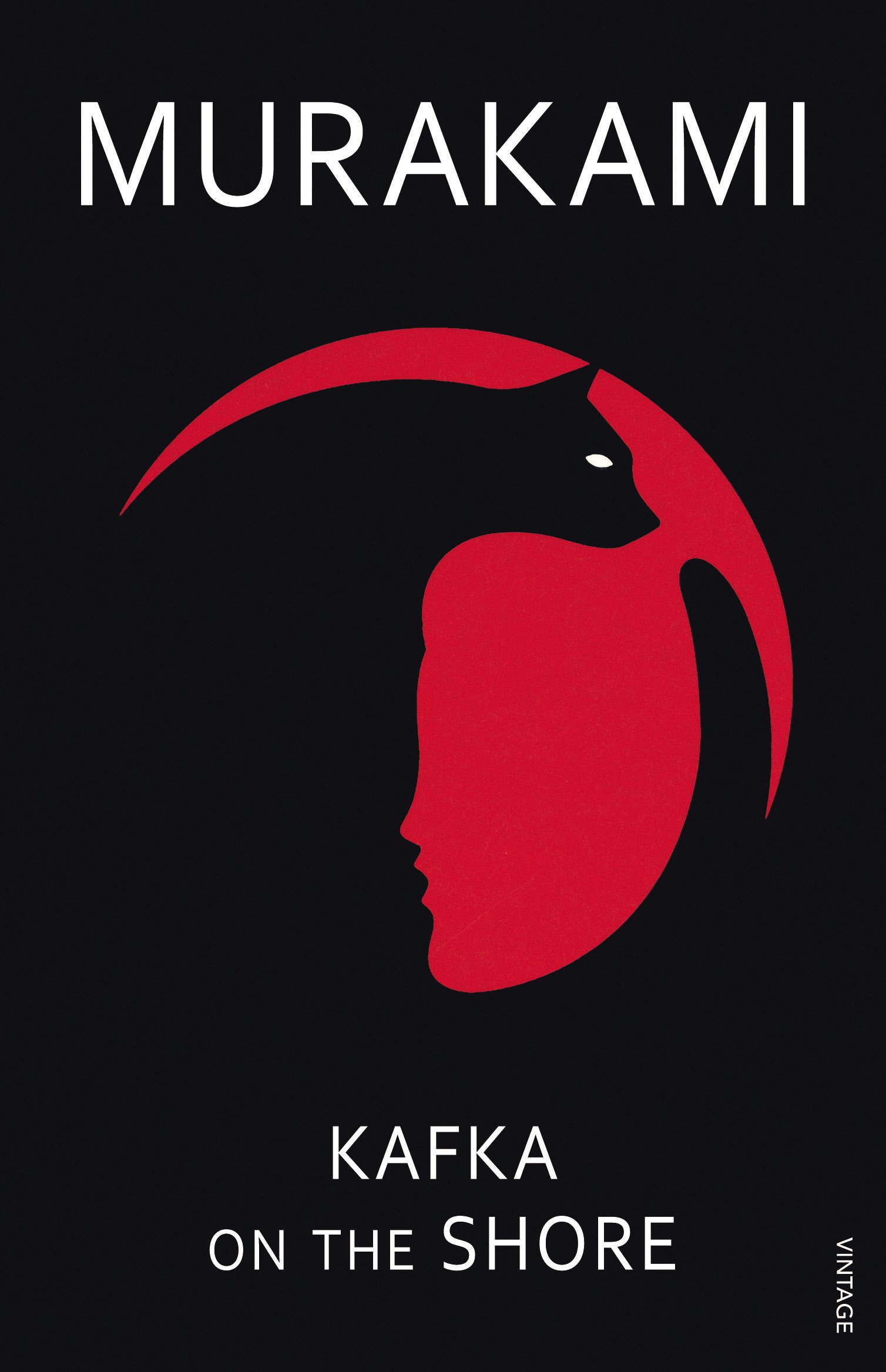
Kafka on The Shore - Haruki Murakami (2002)
3/5 - 8/3/25
Kafka on The Shore is a 2002 novel by Japanese magical realism author Haruki Murakami, one of his more popular works as far as Im aware. It follows 15 year old Kafka Tamura, an alias he chose for himself as he runs away from home in order to avoid his eccentric father’s prophecy, which we learn is that of Oedipus - kill the father, bed the mother. On this journey, he sets out to learn the identity and whereabouts of his mother and adoptive sister, who ran away together from home when he was only 4 years old. His already difficult task is interrupted by him one day waking up on the side of the road, covered in someone else’s blood, and the police on the search for a murderer. He ends up crashing in the apartment of 21 year old Sakura, and then the Komura Memorial Library, making acquaintances with Oshima, the desk clerk, and the library’s current owner, Miss Seiki.
When not with Kafka, we follow the journey of 60-something year old Satoru Nakata, currently residing in Nakano Ward, Tokyo, living off a government subsidy and those who pay him to search for lost cats. A mysterious childhood event in the countryside, while affecting numerous children, left only him comatose, and subsequently with the inability to read or write, and the ability to talk to cats.
I finished Kafka on The Shore about a week ago now - the last 150 pages I got through in a day! - and I still can’t decide whether or not I really like it. I know for a fact I won’t be rereading it, although I tend not to reread books anyway, so Im unsure how much of a factor that is. the surrealness that was plastered all over the blurb finally shone towards the end, and you know what, I enjoyed getting wrapped up in the atmosphere, happy to coast along the soft dreamscape of Kafka’s travels and his last encounter with Miss Seiki.
While I did expect Nakata to die eventually, I didn't anticipate it being so sudden. Having it occur just after he finally decides to take his life into his own hands makes it hit just a little harder... upon writing this, I apparently don't have much more to say here.
Maybe I just expected to be left with morequestions that I was, but I feel most people overstated how confusing the book would be? Or maybe Id just long accepted that not everything would be explained. The only thing that really got me was the white snake that came out of Nakata’s body after he died. Perhaps it’s based on a Greek myth or something. Im not well versed in mythology
Sakura didn’t end up being very plot relevant. She was sort of just there, for the most part. All of the women in this book had Murakami-typical 'odd' characterisation, mainly being present as sex objects for the main character to ogle. Even Oshima wasn't fully immune to this in the end.
…3 stars? Even though Im generally satisfied with the ending, I can’t see myself recommending this to anyone.
Halfway review
Im currently around 60% into Haruki Murakami’s Kafka on the Shore and it’s getting harder to trudge through it. I very rarely decide to put down books half way through, but I might have to make an exception here. I already know this will be my last Murakami book for a while.
The main draw-ins for this novel were Nakata’s ability to talk to cats (which he inexplicably lost at least a hundred pages ago, and Im finding it hard to care how), and the central story of Kafka being a sort of retelling of the myth of Oedipus. If you, like me, have no interest in Greek mythology, this is meaningless. While I do know the basic outline of the myth (kill the father, bed the mother), without having read reviews pointing this out, I would’ve only assumed that, what, the author is fucking weird? We so get a short scene between Kafka and Oshima pointing out the similarities between Kafka’s and Oedipus’ lives, but long before that point we’d already gotten a scene where a woman named Sakura, who Kafka believes could be his sister, decided to jerk him off in her bed as one of the most awkward sex scenes I may have ever read. This is the second woman who is presented as a sex object by Kafka only afterthe suggestion that she may be his sister. Conveniently, the sister that went missing when Kafka was 4 is not related to him by blood! Any mention of Oedipus comes after all of these scenes, by the way.
The direction that the story is moving now puts much more focus on Miss Saeki, and to be frank, this is the only reason Im willing to read on. I think the idea of Kafka suddenly falling in love with her is much more intriguing now that we have his eccentric father’s prophecy laid out. I have an idea where this will go, but I can’t say anything for certain yet.
Pop culture references always irked me in books, although I may be the odd one here for that opinion. Murakami books are chocked full of them, it’s rare to find a chapter that doesn’t mention The Beatles, or American sports teams, or classic novels forcefully brought up in unnatural conversations. And sure, heavy Western music references are sorta common in Japanese books, but… it still irks me. Just a little.
It’s been nearly 2 months since I picked up this books because I simply haven’t wanted to read it most days. Maybe I can power through the last couple hundred pages and see what happens. I am a little curious.
Read from 8/1/25-22/2/25